'India and China have the wise and sage leadership to steer this complex relationship in the coming decades.'
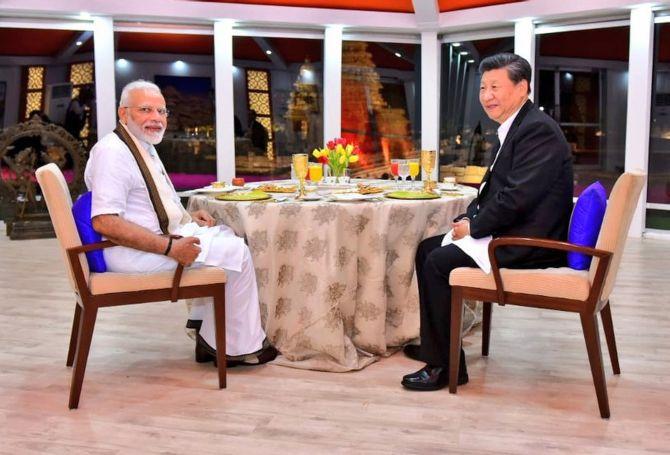
"India-China relations have always been complex. There are many elements of cooperation, but also many elements of competition. As we move ahead into the third decade of the 21st century, I believe India-China relations are going to get even more complex," Ambassador Gautam Bambawale, India's envoy to China during the Wuhan summit in April 2018, tells Rediff.com's Archana Masih in the concluding segment of a two-part interview.
- Part 1: 'China is doing a tit-for-tat'
What do you think is the Chinese objective behind the provocation on the border?
They may want to signal to India that they are worried and upset with the road building activity in Ladakh. China has built its roads and cannot expect to have a veto over our road building.
Many Indian and Chinese analysts, including the Chinese English newspaper Global Times, have said that China does not want India to side with the United States. It would want India to stay neutral in the battle between China and the US.
I find it difficult to believe the argument that the Chinese will carry out a transgression in Ladakh in order to signal to India to be neutral.
In fact, if they continue such intrusions regularly, it may lead to an opposite result and instead of keeping us equidistant from China and US, such actions will drive India into the arms of the US.
Indian public opinion has swung against China for raising the temperature at the India-China border at time when India is battling Covid.
If you take a poll today, a majority of Indians would not see China in a good light.
Indian public opinion will have to be factored in by the government of India of the day.
What does Beijing hope to gain by keeping the border in ferment and yet trying to convey that all is well with India-China relations?
I don't see any gain for China. This is a signal on three fronts:
- They are worried about India's infrastructure and road building activity.
- It is a signal that they are not happy with the revocation of Article 370 and change of status of Ladakh and J&K.
- To accelerate the boundary resolution process.
You don't this is linked to Beijing's uneasiness at New Delhi's proximity to Washington in the Trump era and its perceived need to keep Washington's allies like Australia, Japan, India on edge?
They may be uneasy about it, but if they think by creating tensions on the India-China border they will keep us away from the US, then they are wrong.
As I said earlier, it will only drive us towards the US. China needs to rethink this proposition. Several newspapers in China have made this point which I find incredible and absurd.
India and China have peaks and troughs in their complex diplomatic relations. In the 70th year of establishment of diplomatic relations, where do you see India-China relations headed?
India-China relations have always been complex. There are many elements of cooperation, but also many elements of competition.
As we move ahead into the third decade of the 21st century, I believe India-China relations are going to get even more complex.
Therefore, the leadership on both sides will need to be very sage, calm and rational.
We cannot have Ladakh-like situations on the border areas as we are witnessing this summer. It detracts from the cooperation aspect of the relationship.
As we go forward, this relationship is going to become more difficult and will require very able and competent leaders in both countries to keep it balanced.
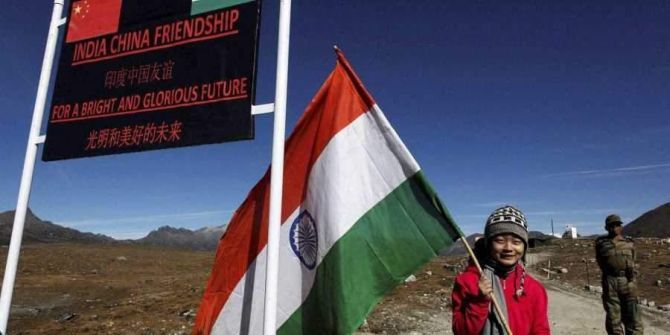
Former ambassador to China Nirupama Rao feels 'Chinese adventurism or expansionism oxygenates China'. Would you agree to that assessment?
I think what Ambassador Rao said was very true. What she was trying to hint at is the use of the nationalism card by China in order to get support for the Chinese Communist Party.
The current leadership of China is definitely using nationalism and territorial ambition to drum up support.
As China becomes more powerful economically and militarily, she is also becoming more aggressive.
I am not sure if that is good for peace and stability in the world. I totally agree with what Ambassador Rao said and I would go as far as to tender some advice to China that as she becomes more powerful, she must also act like a big power.
She must act rationally, diplomatically and calmly.
Like I said, the India-China relationship is going to get more complex and difficult as we move ahead in the third decade of the 21st century.
Has China's view of India changed in the Modi era? Does China feel that India is more assertive and needs to be taught a lesson?
China sees an asymmetry of power between India and China.
There is no doubt about that if you take GDP as a measure of comprehensive national power. China's GDP is about four-and-half times that of India, but China also see a determined government in India which has a vision for a new India.
It also means that it requires calmer, firmer, balanced and sage leadership in both countries.
India needs to build its own economic and military power. India needs to look inward to not only tackle the Covid-induced problems, but in increasing the GDP to 5 trillion dollars as Prime Minister Modi has said and even beyond that.
It requires a lot of effort and India needs a peaceful international situation to focus inwards on its own issues of economic prosperity and social progress.
That is why it is very important for India to have a peaceful neighbourhood to focus inward domestically.
You say our relationship with China is very complex. As a former diplomat, do you feel India needs to employ a cloak and dagger approach with China rather than openly saying that we will take back Aksai Chin from the Chinese?
Some statements are made with the domestic audience in mind. This is done by all countries, including China.
Such statements are made to shore up support for the government and the party in power domestically, but when it comes to dealing with international issues and other countries a balanced view is put to the fore.
India and China have the wise and sage leadership to steer this complex relationship in the coming decades.
How long do you think it will take to resolve this Eastern Ladakh situation?
It will take a few rounds of diplomacy. People often don't understand that diplomacy happens at several levels.
The discussions taking place between the generals on the border is an example of military diplomacy, just as civilian diplomacy is taking place between Delhi and Beijing and sometimes it is taken to a higher level between the leadership of the countries.
I believe a few more rounds of diplomacy, discussions and negotiations will be required to ease the situation in eastern Ladakh, but I am sure we will be able to de-escalate the situation and confident that we will restore the status quo ante.
Production: Aslam Hunani/Rediff.com



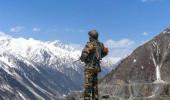





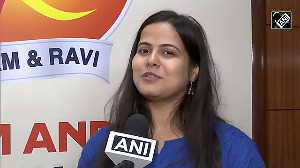
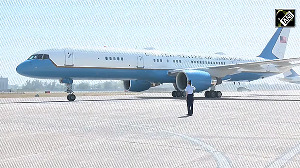

 © 2025
© 2025